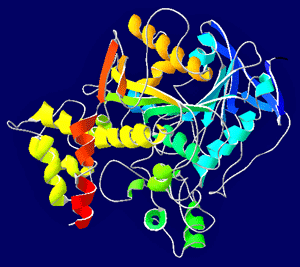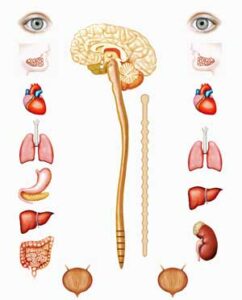Mestinon is

Mestinon blocks acetylcholinesterase from breaking down acetylcholine – the main neurotransmitter of the autonomic nervous system
Mestinon or pyridostigmine bromide is an acetylcholinesterase inhibitor that prevents the acetylcholinesterase enzyme from breaking down a neurotransmitter called acetylcholine. Mestinon is also classified as a parasympathomimetic – a drug that enhances parasympathetic nervous system activity. Mestinon also is able to enhance the production of other neurotransmitters such as norepinephrine and dopamine.
Mestinon is an old drug that was patented in 1945 and has been in use since 1955. Now a generic drug, the chemical agent pyridostigmine bromide is available under the brand names Mestinon, Regonol, and Gravitor.
Acetylcholine is the chief neurotransmitter of the parasympathetic nervous or “rest and digest” system,(also called the cholinergic nervous system) and also acts as a neuromodulator. It produces manifold effects including enhancing muscle contractions during exercise, dilating the blood vessels, slowing the heart rate, enhancing neuroplasticity, boosting motivation, increasing pleasurable feelings, helping arouse one to action, and enhancing productivity and task completion.
Mestinon is most often used to treat myasthenia gravis and is being used off-label to treat orthostatic hypotension (OH), postural orthostatic tachycardia syndrome (POTS), Ehlers-Danlos Syndrome (EDS), chronic fatigue syndrome (ME/CFS), and now lately post-acute-sequelae of SARS CoV-2 (PASC) otherwise known as long COVIDl
Mestinon Might Work in ME/CFS, POTS, Fibromyalgia, or Long COVID Because…

Mestinon enhances the activity of parasympathetic nervous system
Many heart rate variability (HRV) studies indicate that the parasympathetic arm of the autonomic nervous system (PNS) has become inhibited and is no longer keeping the sympathetic nervous system (SNS) or “fight or flight” arm of the ANS in check in ME/CFS, fibromyalgia and POTS. Mestinon may also be able to increase growth hormone levels in these diseases.
David Systrom – the foremost proponent of pyridostigmine bromide in ME/CFS – believes that by triggering the release of norepinephrine, Mestinon is causing the veins to properly narrow, thus propelling blood back up to the heart and giving the muscles more blood. He notes that retrospective studies – studies done after the fact – suggest that pyridostigmine for ME/CFS can improve oxygen uptake, end-tidal carbon dioxide levels, and ventilatory efficiency.
Fnding a way to boost the PNS by increasing acetylcholine levels could conceivably help with fatigue, gut, sleep, cognitive, stimuli hypersensitivity, and emotional lability issues.
ME/CFS, POTS, and Long COVID Studies and Doctors Reports
While Mestinon has been recommended by some ME/CFS and POTS experts dating back to the 1990’s no large-scale studies have assessed its effectiveness in either disease.
Three case reports published in 2003 reported pyridostigmine bromide resulted in “marked”, “dramatic” and “improvement in fatigue”. The authors suggested that ME/CFS may result from “a combination of mild neuromuscular transmission defect combined with cholinergic dysautonomia”. AMMES reports that Dr. Jay Goldstein recommended Mestinon to improve muscle strength and help with mental clarity. Eight people with ME/CFS reported good results on the AMMES site.
A person with longstanding ME/CFS found that Mestinon allowed her to exercise again, improved her sleep, removed her alcohol intolerance, and enabled her to work full days.
A Mestinon Miracle: Vagus Nerve Stimulating Drug Helps Long Time ME/CFS Patient Exercise
A large (n=154) fibromyalgia trial that combined pyridostigmine bromide (PD) that while PD did not improve exercise it did significantly improve heart rate variability, sleep, and anxiety and that the drug was well tolerated.
Grubb reported that of 203 POTS patients seen at a center that 43% of all patients or 51% who were able to tolerate the drug received benefit. Fatigue (55%), palpitations (60%), presyncope (60%), and syncope (48%) most commonly improved symptoms. Upright heart rates and diastolic blood pressures were reduced as well.
Eighty-five percent of people with orthostatic intolerance reported benefiting from Mestinon in a survey. One case report indicated that pyridostigmine provided significant benefits to a person with POTS. Another found that the drug improved baroreflex sensitivity, reduced heart rate, increased norepinephrine levels, and improved symptoms in a person with orthostatic intolerance.
No data on Mestinon’s effectiveness in long COVID exists but the similar exercise and orthostatic intolerance findings in it and ME/CFS suggest it may be helpful.
Side Effects
Mestinon can cause several side effects including gastrointestinal problems (nausea, vomiting, upset stomach, diarrhea, cramping), increased saliva, increased urination, increased sweating, rash/itching, warm/tingly feelings.
Clinical Trials Underway
David Systrom, a pulmonologist at Brigham and Women’s Hospital at Harvard conducted a proof-of-concept biologically based Mestinon trial that is having patients exercise – take Mestinon – and then exercise again. The study concluded that Mestinon, relative to the placebo, improved cardiac output and peak energy production, and calmed the participant’s systems down during rest.
A 50-person Mayo Clinic POTS study is expected to end in Feb 2023 and the Open Medicine Foundation has begun a Mestinon/low dose naltrexone ME/CFS that will assess the two drugs separately and together and, in hopes of learning more about ME/CFS, will dig deep into the physiological changes that occur.
Lifting ME/CFS: The OMF’s Unique Two-Drug Clinical Trial to Begin Soon
Natural Alternative?
Huperzine A has been proposed as a natural alternative for Mestinon and some people reportedly do well on it. Learn more about the pros and cons of huperzine A here.
Conclusions
Mestinon is not a wonder drug and better studies need to be done but it does appear to significantly help some people with ME/CFS, fibromyalgia, and/or POTS. We should soon know what effects Mestinon has on the ability of people with ME/CFS to exercise and, if another study goes well, should begin to understand which people with ME/CFS it may benefit.




